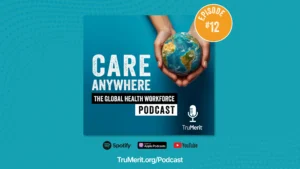Employees Are Athletes Too and Can Benefit From Athletic Trainers
Athletic trainers are for more than athletes; even employees can benefit from the multidisciplined training that these healthcare professionals can provide for the workplace. To discuss this emerging trend on the Healthcare Podcast, host Daniel Litwin sat down with Bryan Reich, director of the industrial athlete program for WorkCare, an Anaheim-based occupational health company that helps businesses efficiently manage all aspects of work-related health.
Reich heads up WorkCare’s occupational health program for “industrial athletes,” or what you and I might more commonly call employees. Just as athletes experience injury from trauma and repetitive motion in sports, employees are susceptible to injury as well, Reich said.
“The sprains and strains that are seen in the sports world cross over into the occupation space, especially in manufacturing, utility, or high industry where the workers have a repetitive job doing the same motion over and over,” Reich said. “It’s very similar to what we see in a sports setting.”
That’s why athletic trainers are highly qualified, accredited, and licensed healthcare professionals, he said. They’re recognized by the American Medical Association, the Health Resource Service Administration, and the Department of Health and Human Services as allied health care professionals.
Helping treat and prevent workplace injuries help companies keep down the cost of worker’s comp insurance and other injury-related expenses. Reich explained how trainers can bring proactive medicine to the workplace and how that can translate to the bottom line.
For the latest news, videos, and podcasts in the Healthcare Industry, be sure to subscribe to our industry publication.
Follow us on social media for the latest updates in B2B!
Twitter – @HealthMKSL
Facebook – facebook.com/marketscale
LinkedIn – linkedin.com/company/marketscale








